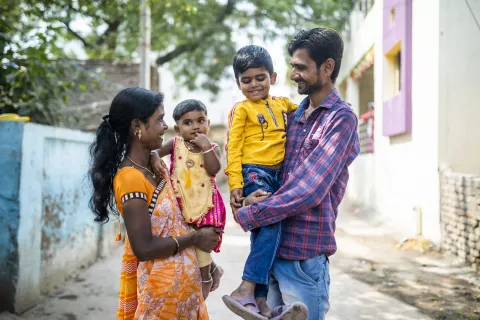Whether it's throwing a ball, dancing or a game of tag, everyone knows play when they see it. Irrespective of economic background or culture, people all over the world engage in play in one form or another. Yet not everyone understands play is a biological imperative for every child.
Play is how young children learn to navigate the world, and build narratives, knowledge and social skills. Play is essential business for children. It is an effective way for parents and children to connect and express love.
Why is play important?
Children learn best through play. Play creates powerful learning opportunities across all areas of development – intellectual, social, emotional and physical. Through play, children learn to forge connections with others, build a wide range of leadership skills, develop resilience, navigate relationships and social challenges as well as conquer their fears. When children play, they feel safe. Children play to make sense of the world around them. More generally, play provides a platform for children to express and develop imagination and creativity, which are key skills critical for the technology-driven and innovative world we live in.
Playful interactions contribute to the well-being and positive mental health of parents, caregivers and children. When humanitarian crises turn a child’s world upside down, it is in play that children can both find safety and respite from adverse experience while also being able to explore and process their experiences with the world. When children are driven from their homes by war, conflict, and displacement, access to nurturing relationships with parents/caregivers and peers are critical buffers from the effects of violence, distress and other adverse experiences. Play comforts and soothes children.
To encourage playful interactions between parents/caregivers and children, governments and other stakeholders need to create an enabling environment.
What are the challenges and solutions?
Promoting safe and healthy environments for parents to engage and play with children is important for them to thrive. However, parents and caregivers may experience a lack of bandwidth and support to engage in play with their children due to various stressors, including financial, personal and professional ones. Moreover, a low awareness of the value of play can be an obstacle to increased demand among parents and caregivers and policy makers for national policy change, and parenting support programmes.
To encourage playful interactions between parents/caregivers and children, governments and other stakeholders need to create an enabling environment. This includes creating policies that promote play-based learning and affirm children’s right to play, and investments in parenting support programmes that support caregivers’ health and well-being and equip parents/caregivers with the skills needed to engage in play with their children. These policies should equip parents/caregivers with the support they need, including through: paid parental leave; quality, affordable, accessible childcare; spending power through social benefits such as universal basic income; mental health support; and the creation of supportive communities and networks.
Increasing the demand for play and fostering public support will require strategies that help parents understand the immense benefits of play, recognize their role in providing meaningful play experiences in the home environment, and empowering them to engage in play with their children.
Playful interactions between caregivers and children could include games that require no objects/tools like peek-a-boo, hide and seek, or simply responding to a child’s facial expressions and sounds. However, for games that require solid objects to make play possible, the materials do not have to be expensive. Children’s learning environments can be enriched with locally produced toys and materials that are informed by their communities’ traditional learning and play context. In the home, they could be made of ordinary household items that are safe for children to play with.
Call to action
Now more than ever, we need to provide parents and caregivers with the support needed to care for and play with their children. Together, we can build a world of play and connection for every child everywhere.
As part of a new advocacy partnership, UNICEF and the LEGO Foundation are supporting countries around the world to increase the number of children who benefit from playful parenting through targeted political advocacy and public engagements that promote well-being. The partnership will support advocacy with governments and other stakeholders to scale-up parenting programmes that reduce adverse childhood experiences such as abuse and neglect, and the creation of both awareness and demand amongst the public.
About the authors
Oluwatosin Akingbulu, Advocacy and Communication Specialist, UNICEF
Boniface Kakhobwe, Early Childhood Development, UNICEF
Aaron Lee Morris, Early Childhood Development Specialist, the LEGO Foundation
Radhika Mitter, Early Childhood Development, UNICEF
Benjamin Perks, Head of Advocacy, UNICEF
Euan Wilmshurst, Head of Advocacy & Communication, the LEGO Foundation





